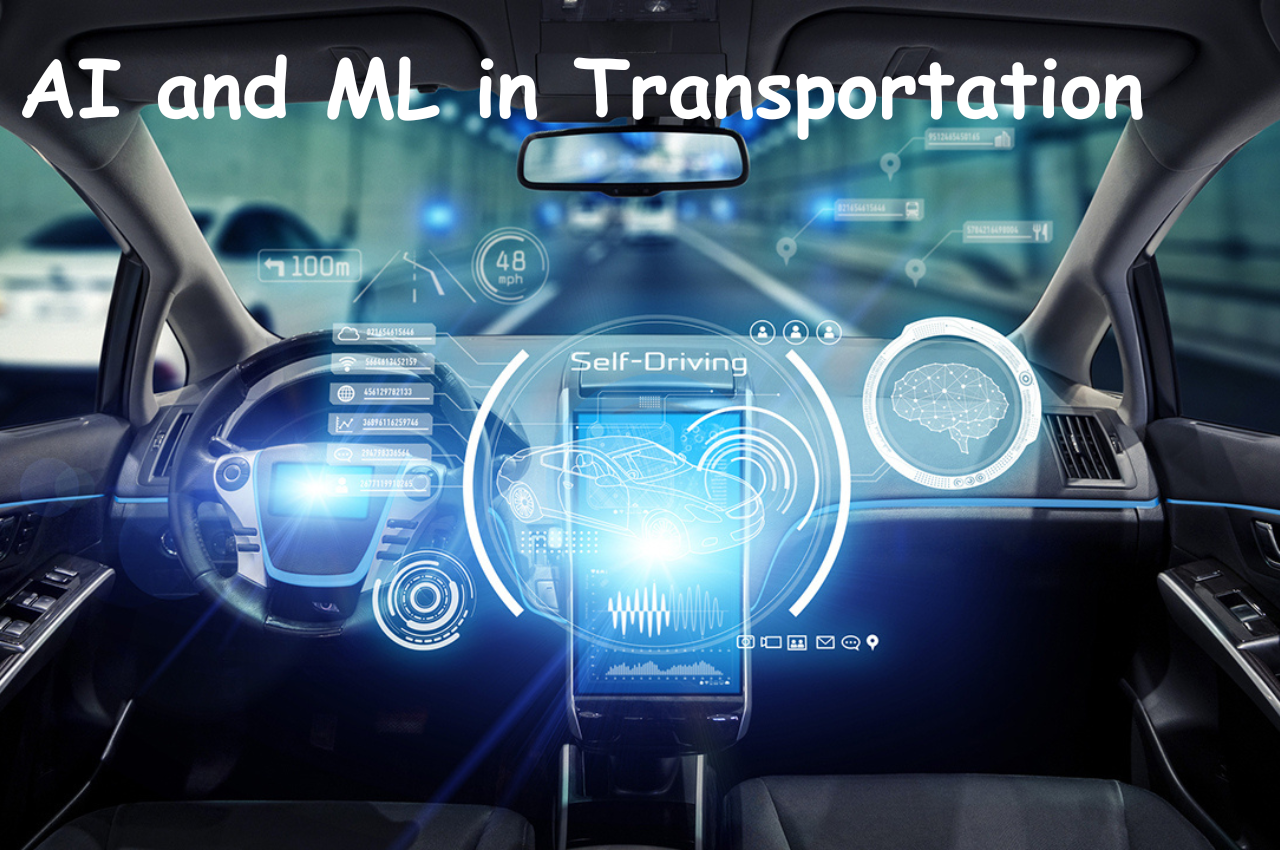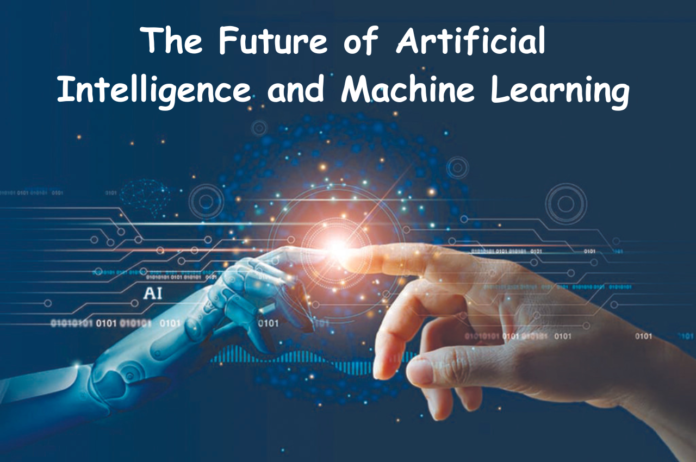Artificial Intelligence (AI) and Machine Learning (ML) have come a long way since their inception and their impact is visible across industries, making people’s day-to-day activities much easier. Technology has revolutionized the way we interact with machines and has the potential to drastically change the way we live in the near future. In this article, we will discuss the “Future of Artificial Intelligence and Machine Learning” and how it will affect various industries. So let’s begin-
Thank you for reading this post, don't forget to subscribe!Future impact of AI & machine learning in different sectors
Most early industries have been deeply influenced by artificial intelligence and machine learning, particularly narrow AI, which uses data-trained models to perform objective tasks. Nowadays, data collection and analysis has been significantly accelerated due to the Internet of Things (IoT), the increase in the number of linked devices and the improvement in computing speed. There is no denying the impact that AI has had in our daily lives today. The impact of “The Future of Artificial Intelligence and Machine Learning” across various sectors is expected to be profound, revolutionizing industries, business processes and everyday life in many ways. Here is a glimpse of how artificial intelligence and machine learning can impact various sectors.
Education
The future impact of AI and machine learning in education is expected to be profound, reshaping various aspects of teaching and learning. AI algorithms can analyze students’ learning patterns and preferences to provide personalized learning experiences. AI-powered tutoring systems can provide real-time feedback and support to students, acting as virtual tutors that are available 24/7. These systems can help students with homework, practice exercises, and concept reinforcement, supplementing traditional classroom instruction.
Machine learning algorithms can analyze vast amounts of educational data to identify patterns and trends, helping educators make data-driven decisions to improve teaching strategies, curriculum design, and student interventions. AI-powered grading systems can automate the grading process for assignments, quizzes, and exams, freeing up teachers’ time to focus on more meaningful interactions with students. These systems can also provide instant feedback to students, promoting faster learning and improvement. AI technologies can enhance virtual classrooms and online learning platforms by enabling features such as automated transcription, language translation, and facial recognition for attendance tracking. This can make remote learning more accessible and engaging for students worldwide.
AI algorithms can generate educational content, such as quizzes, tutorials, and simulations, based on specific learning objectives and curriculum standards. Machine learning models can predict students’ academic performance, behavior, and risk of dropping out based on various factors, such as attendance, engagement, and socio-economic background. As AI becomes more integrated into education, it raises important ethical and social considerations, such as data privacy, algorithmic bias, and digital divide issues. Educators, policymakers, and stakeholders must address these challenges to ensure that AI technologies in education are deployed responsibly and equitably.
Employment
The impact of “The Future of Artificial Intelligence and Machine Learning” on employment is expected to be significant and multifaceted. While these technologies offer numerous opportunities for efficiency, productivity, and innovation, they also pose challenges and disruptions to traditional employment patterns. AI and machine learning are likely to automate routine and repetitive tasks across various industries. This automation may lead to job displacement for workers whose roles primarily involve tasks that can be easily automated. Jobs in manufacturing, transportation, retail, and administrative support are particularly vulnerable.
While some jobs may be displaced, AI and machine learning will also create new job roles and opportunities. These may include positions such as AI ethicists, data scientists, AI trainers, and machine learning engineers. Additionally, as AI systems become more prevalent, there will be a growing demand for workers skilled in human-computer interaction, cybersecurity, and AI oversight. To adapt to the changing job market, workers will need to acquire new skills and competencies. Lifelong learning and continuous training will become essential to remain employable. Employers, educational institutions, and governments will need to collaborate to provide accessible reskilling and upskilling programs to help workers transition to new roles.
AI and machine learning have the potential to augment human capabilities rather than replace them entirely. The impact of AI and machine learning on employment will vary across industries. Some sectors, such as healthcare, finance, and agriculture, are expected to experience significant transformations due to AI technologies. By embracing innovation, investing in education and training, and fostering inclusive growth, we can harness the transformative power of AI to create a more prosperous and equitable future for all.
Healthcare
The future impact of AI and machine learning in healthcare is expected to be profound and transformative across various aspects of the healthcare ecosystem. AI algorithms can analyze large datasets of patient information, including genetic data, medical history, and lifestyle factors, to tailor treatment plans to individual patients. AI-powered devices and wearables can continuously monitor patients’ vital signs and symptoms, enabling early detection of health problems and allowing for timely intervention. Telemedicine platforms powered by AI can also provide remote consultations and follow-ups, improving access to healthcare services, especially in underserved areas.
AI algorithms can optimize hospital and healthcare facility operations by predicting patient admission rates, scheduling staff efficiently, and managing inventory and supplies. This can help reduce wait times, improve resource allocation, and enhance overall operational efficiency.
Entertainment
AI and machine learning are poised to have a significant impact on the entertainment industry in various ways. AI algorithms can analyze vast amounts of data to understand audience preferences and create tailored content. This could lead to highly personalized experiences in gaming, streaming services, and other forms of entertainment. Machine learning algorithms can enhance content discovery by providing more accurate recommendations based on individual user behavior and preferences. This can help users discover new movies, music, games, and other forms of entertainment that they may enjoy.
Read More: Challenges of Implementing Artificial Intelligence and Machine Learning
AI algorithms can help automate content curation and moderation tasks on platforms like streaming services and social media, ensuring that inappropriate content is filtered out and that users are presented with high-quality content. Entertainment companies can leverage AI to analyze audience data and predict the success of movies, TV shows, music albums, and video games before they are released. This can help them make more informed decisions about which projects to invest in.
Manufacturing
The impact of AI and machine learning in manufacturing is expected to continue growing significantly in the future, revolutionizing various aspects of the industry. AI and machine learning algorithms can analyze historical data from machinery to predict when equipment is likely to fail. This enables manufacturers to schedule maintenance before breakdowns occur, minimizing downtime and reducing maintenance costs.
E-commerce
AI algorithms analyze customer behavior, preferences, and past purchases to offer personalized product recommendations. This increases customer engagement and satisfaction, leading to higher conversion rates and customer loyalty. Machine learning algorithms can analyze various factors such as demand, competitor pricing, and customer behavior in real-time to optimize pricing strategies. This helps e-commerce businesses maximize profits while remaining competitive.
Overall, AI and machine learning have the potential to transform every aspect of the e-commerce industry, from personalized shopping experiences to efficient supply chain management. As these technologies continue to evolve, e-commerce businesses that embrace AI will gain a competitive edge in the market.
Transportation
AI and machine learning are poised to have a transformative impact on the transportation sector in numerous ways. AI and machine learning are crucial for the development and deployment of autonomous vehicles. These technologies enable AVs to perceive their environment, make real-time decisions, and navigate safely. As AV technology matures, it could revolutionize transportation by reducing accidents, improving traffic flow, and increasing mobility for people who are unable to drive. Machine learning algorithms can analyze data from sensors embedded in vehicles, trains, and airplanes to predict when maintenance is required. By identifying potential issues before they occur, transportation companies can reduce downtime, improve safety, and lower maintenance costs.
 AI and machine learning hold tremendous potential to revolutionize the transportation sector by improving safety, efficiency, accessibility, and sustainability. However, their widespread adoption will also bring challenges related to data privacy, cybersecurity, and workforce displacement that will need to be addressed proactively.
AI and machine learning hold tremendous potential to revolutionize the transportation sector by improving safety, efficiency, accessibility, and sustainability. However, their widespread adoption will also bring challenges related to data privacy, cybersecurity, and workforce displacement that will need to be addressed proactively.
Banking & Finance
AI and machine learning algorithms can analyze vast amounts of data to assess credit risk more accurately. By analyzing borrower behavior, market trends, and macroeconomic indicators in real-time, these technologies can help financial institutions make more informed lending decisions and manage their overall risk exposure more effectively. Chatbots and virtual assistants powered by AI are increasingly being used in customer service to handle inquiries, provide support, and assist customers with basic banking tasks. These AI-driven interfaces can offer personalized recommendations, streamline customer interactions, and enhance overall customer satisfaction.
Media
AI and machine learning algorithms are increasingly being used to generate and curate content. This includes automated writing of news articles, generating video summaries, and even creating music or artwork. These technologies enable media companies to produce content at scale and personalize it for individual users based on their preferences and behavior. AI-powered recommendation systems analyze user behavior and preferences to suggest relevant content, improving user engagement and retention. These systems are used by streaming platforms, news websites, and social media platforms to deliver personalized experiences to their users.
Cyber security
AI-powered systems can respond to security incidents in real-time, automatically mitigating threats and minimizing the impact of cyber attacks. This includes actions such as isolating compromised systems, blocking malicious traffic, and initiating remediation measures. AI and machine learning can analyze historical data and current trends to predict future cybersecurity risks and vulnerabilities. By identifying potential weaknesses proactively, organizations can take preemptive measures to strengthen their security posture and prevent future attacks.
Customer Service
The impact of AI and machine learning in customer service is poised to be transformative, affecting various aspects of the customer experience and operational efficiency. Machine learning algorithms can automate routine customer inquiries and support tasks, enabling faster response times and reducing wait times for customers. Chatbots and virtual assistants can handle common queries instantly, freeing up human agents to focus on more complex issues.
Final thoughts
In today’s discussion at Technocomy, The Future of Artificial Intelligence and Machine Learning is undeniably strong. The benefits we are reaping from AI in the current era will have far-reaching global implications for discussions and preparations that will revolutionize artificial intelligence on economics, law, politics and regulation.
Technocommy is a connecting space, the leading growth and networking organization for business owners and leaders. Do I qualify?


